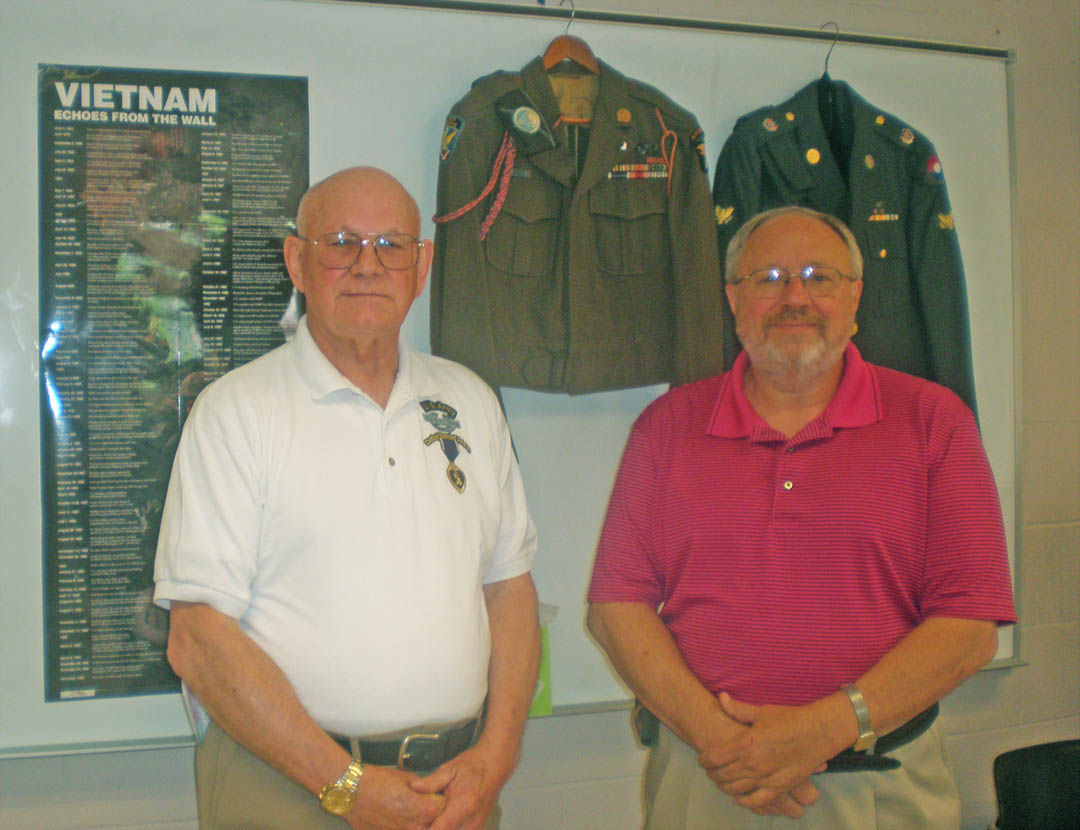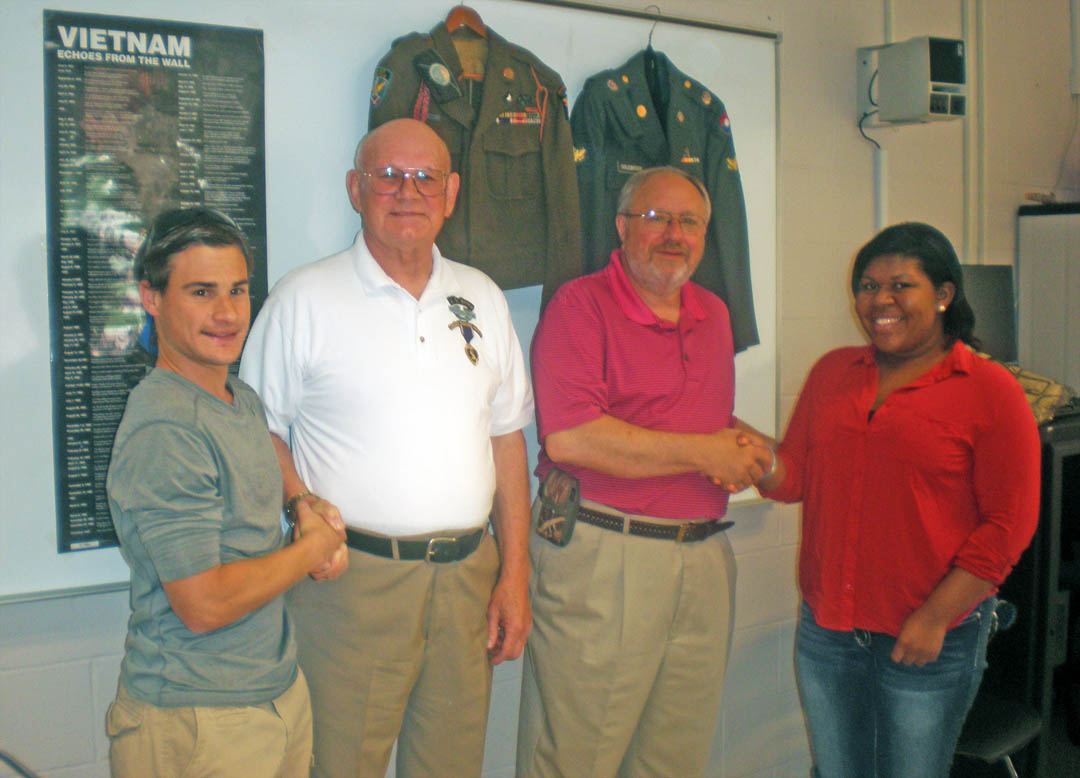College News
Vets take CCCC students inside Vietnam War experience
Notice: This article is older than 12 months. Names, contact information, programs, titles, etc. might have changed. If you have any problems please call the main college number, 1-800-682-8353, and we will be happy to direct you accordingly.

click image to enlarge ⊗
Vietnam War veterans Ray Yamrus (left), of Cameron, and Bill Colebrook, of Sanford, visited the American ... (more)

click image to enlarge ⊗
Vietnam War veterans Ray Yamrus (center, left), of Cameron, and Bill Colebrook, of Sanford, visited ... (more)
06.18.2014 • Admin, Faculty & Staff • College & Community • College General • Curriculum Programs
SANFORD - Hot, deadly and unpredictable is the way Vietnam War veterans Ray Yamrus and Bill Colebrook described their experiences to an American history class at Central Carolina Community College recently. The class was studying a unit on the Vietnam War.
It was November 1966 and infantryman Ray Yamrus was out on patrol just outside of Saigon. The patrol leader was young and inexperienced. He decided to go down an unfamiliar trail looking for Viet Cong and the patrol found them.
"We didn't get 50 yards down that trail before we were ambushed," Yamrus said. "I thought I saw movement in the jungle, and I shot. My gun jammed. A bullet hit me in the back and exited through my chest. My lung collapsed, and I had what they call a sucking chest wound. I knew I couldn't pass out or I would stop breathing."
Yamrus, who completed two tours in Vietnam, said he went over "looking for a fight." During his first time to see action, his helicopter was fired upon.
"This wasn't training any more. These people were trying to kill me," he said.
Bill Colebrook worked the Mekong Delta supporting the ground troops. Heat is what he remembers most.
"We all suffered from dehydration, heat exhaustion and fatigue," Colebrook said. "We fought a guerilla war. It was snipers. It was small patrols. It was booby traps. These people had been fighting this way for a thousand years. It was effective. It was hard to defeat an enemy like that."
Colebrook, who ended up being a gunner on a Huey helicopter, said that seven out of the 25 helicopters in his unit were shot down. He left Vietnam just 10 days before the Tet Offensive, a pivotal campaign in which approximately 100 cities in South Vietnam were attacked. The assault was repelled by the United States and South Vietnam forces, but it proved to America that the Viet Cong were stronger and more organized than previously thought.
By 1968, the Vietnam War had become very unpopular with the American people. It ended with the withdrawal of U.S. forces in 1973 and the unification of Vietnam under communist control two years later. More than three million people, including 58,000 Americans, were killed in the conflict.
"It was a political war, a civil war" said Colebrook. "Maybe we should have settled it in another way. We can't be the peacemakers of the whole world. I just don't think we can."
Yamrus agreed. "War is not playful; it's terror," he said. "War movies about Vietnam seem too altruistic. They're missing the smell of blood, of people who have been in the jungle a long time. Every day I think about Vietnam - every day."
CCCC history instructor Bianka Stumpf invited the veterans because she wanted the students to get a real sense of what the Vietnam War experience was like.
"My American history students are intrigued by the Vietnam War," said Stumpf. "Creating opportunities for students to supplement their academic study with living history not only honors those memories but engages students and challenges them to integrate truths from many sources. These kinds of opportunities make history more meaningful for students and expose its complexities."
Having Colebrook and Yamrus tell their stories also gives students a different perspective on the Vietnam War, Stumpf explained.
"Historian Carl Becker is credited with saying something I've long remembered and valued: 'History is the memory of things said and done,' " she said. "His point relates to the importance of the perspective of the person who actually experiences the history. Students who hear Yamrus' and Colebrook's remembrances leave with an appreciation of the sacrifices of these two men and the thousands of others who fought. They leave with an unforgettable experience."
For more information about Central Carolina Community College, call one of the campuses or centers in Chatham, Harnett or Lee counties, or access the web site at www.cccc.edu.
Categories
- Admin, Faculty & Staff Category
- Arts & Entertainment Category
- Clubs Category
- College & Community Category
- College General Category
- Continuing Education Category
- Curriculum Programs Category
- Distance Education Programs Category
- Facilities/Buildings Category
- Finances Category
- Foundation Category
- Graduations Category
- Lee Early College Category
- NCCCS Category
- SGA Category
- Special Events Category
- Sports Category
- Students/Graduates Category
- Uncategorized Category
Archives

